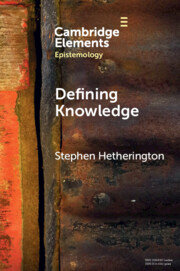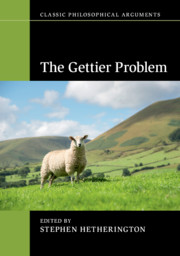36 results

Defining Knowledge
- Method and Metaphysics
-
- Published online:
- 19 October 2022
- Print publication:
- 10 November 2022
-
- Element
- Export citation
Fallibilism and Knowing That One Is Not Dreaming
-
- Journal:
- Canadian Journal of Philosophy / Volume 32 / Issue 1 / March 2002
- Published online by Cambridge University Press:
- 01 January 2020, pp. 83-102
-
- Article
- Export citation
Tooley's Theory of Laws of Nature
-
- Journal:
- Canadian Journal of Philosophy / Volume 13 / Issue 1 / March 1983
- Published online by Cambridge University Press:
- 01 January 2020, pp. 101-106
-
- Article
- Export citation
ANCIENT PHILOSOPHERS ON DEATH AND IMMORTALITY - (A.G.) Long Death and Immortality in Ancient Philosophy. Pp. viii + 232. Cambridge: Cambridge University Press, 2019. Cased, £74.99, US$99.99. ISBN: 978-1-107-08659-3.
-
- Journal:
- The Classical Review / Volume 70 / Issue 1 / April 2020
- Published online by Cambridge University Press:
- 29 October 2019, pp. 224-226
- Print publication:
- April 2020
-
- Article
- Export citation
Copyright page
-
- Book:
- The Gettier Problem
- Published online:
- 05 November 2018
- Print publication:
- 08 November 2018, pp iv-iv
-
- Chapter
- Export citation
13 - The Gettier Problem’s Explicability Problem
-
-
- Book:
- The Gettier Problem
- Published online:
- 05 November 2018
- Print publication:
- 08 November 2018, pp 218-234
-
- Chapter
- Export citation
Contents
-
- Book:
- The Gettier Problem
- Published online:
- 05 November 2018
- Print publication:
- 08 November 2018, pp v-vi
-
- Chapter
- Export citation
Index
-
- Book:
- The Gettier Problem
- Published online:
- 05 November 2018
- Print publication:
- 08 November 2018, pp 252-258
-
- Chapter
- Export citation
Contributors
-
- Book:
- The Gettier Problem
- Published online:
- 05 November 2018
- Print publication:
- 08 November 2018, pp vii-viii
-
- Chapter
- Export citation
Introduction: Meet the Gettier Problem
-
-
- Book:
- The Gettier Problem
- Published online:
- 05 November 2018
- Print publication:
- 08 November 2018, pp 1-10
-
- Chapter
- Export citation
Preface
-
- Book:
- The Gettier Problem
- Published online:
- 05 November 2018
- Print publication:
- 08 November 2018, pp ix-x
-
- Chapter
- Export citation
Bibliography
-
- Book:
- The Gettier Problem
- Published online:
- 05 November 2018
- Print publication:
- 08 November 2018, pp 235-251
-
- Chapter
- Export citation

The Gettier Problem
-
- Published online:
- 05 November 2018
- Print publication:
- 08 November 2018
Chapter 10 - Knowledge and Knowledge-Claims
-
-
- Book:
- Interpreting J. L. Austin
- Published online:
- 04 November 2017
- Print publication:
- 16 November 2017, pp 206-222
-
- Chapter
- Export citation
5 - Explicating Gettierism: Infallibility Presuppositions
-
- Book:
- Knowledge and the Gettier Problem
- Published online:
- 05 August 2016
- Print publication:
- 01 September 2016, pp 138-164
-
- Chapter
- Export citation
1 - Introducing Gettierism
-
- Book:
- Knowledge and the Gettier Problem
- Published online:
- 05 August 2016
- Print publication:
- 01 September 2016, pp 1-31
-
- Chapter
- Export citation
Copyright page
-
- Book:
- Knowledge and the Gettier Problem
- Published online:
- 05 August 2016
- Print publication:
- 01 September 2016, pp iv-iv
-
- Chapter
- Export citation
2 - Explicating Gettierism: A General Challenge
-
- Book:
- Knowledge and the Gettier Problem
- Published online:
- 05 August 2016
- Print publication:
- 01 September 2016, pp 32-52
-
- Chapter
- Export citation
4 - Explicating Gettierism: Modality and Properties
-
- Book:
- Knowledge and the Gettier Problem
- Published online:
- 05 August 2016
- Print publication:
- 01 September 2016, pp 107-137
-
- Chapter
- Export citation



